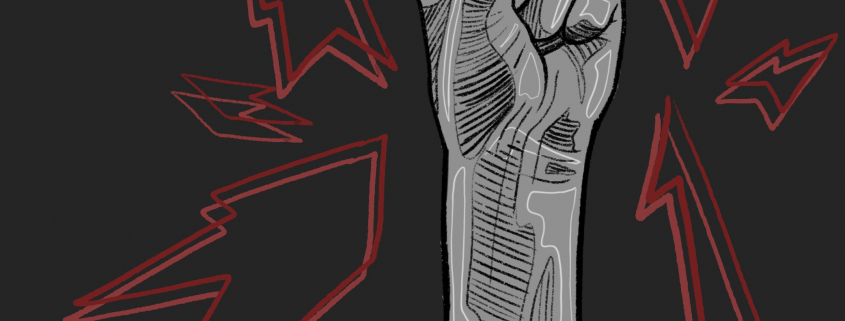The medium is the message: disruption and Black Lives Matter

“Violence is never the answer” is just not the answer anymore. The opinion that violent or disruptive protests are an inappropriate vehicle to incite overdue social change is not the harmless middle ground perspective that people seem to think it is.
This notion is more relevant than ever in light of the recent Black Lives Matter protests sparked by the disturbing killing of George Floyd, yet another Black victim of police brutality, by Derek Chauvin of the Minneapolis Police Department. These protests strive for anti-racist reform on U.S. law enforcement.
Based on the historical and sociological contexts that characterize the U.S. cultural landscape, to say that violence and disruption are unwarranted in the fight for the equal protection of Black people in the United States is to effectively will that nothing changes for the Black community.
In the discussion surrounding the fight for racial justice, the general U.S. public is quick to refer to civil rights leader Martin Luther King Jr. as an example of a very successful and, most notably, peaceful activist for Black rights. Even former Arkansas Gov. Mike Huckabee deferred to King in an interview with CNN, criticizing the current Black Lives Matter movement in favor of the civil rights movement, claiming that “[King would] be appalled by the notion that we’re elevating some lives above others” and soon after claiming that the real solution to these kinds of issues is “loving people and treating people with dignity and respect.”
The attempt to discredit Black Lives Matter in the name of pacifism, pointing to more peaceful and successful Black rights movements, would be stronger if there ever actually was such a thing. King’s protests were far from nonviolent. From the Children’s Crusade, in which Black youth shockingly assembled to confront the police violence at their protests, to his own words, “Freedom is never voluntarily given by the oppressor; it must be demanded by the oppressed,” King promoted and enacted civil disruption to achieve his ends. In any useful efforts to dismantle the racism entangled in the United States’ very roots, civil disruption and precursors of violence have been a prerequisite.
Now is no different. To withhold support for disruptive protests is to establish a roadblock on the only historically viable path to justice for Black Americans in this country.
On a more principled level, one could argue that, in the words of Marshall McLuhan, the medium is the message. There is an inherent link between the character of a message and its vehicle. At this point, criticism of the disruptive nature of the demonstrations is almost inextricably tied to criticism of the plight itself.
If the systematic oppression of Black people in the United States were not so bad and so persistent and did not cut horizontally across all vertical avenues for peaceful activism, there would be no need for violence and disruption. If a Black person in the United States were not three times more likely to be killed by the police than a white person, despite the disparity in population size favoring white people, then maybe the protesters could afford to ease up a little. If peaceful attempts at protesting police brutality, such as taking a knee during the national anthem on live television, did not get quickly dismissed, classified as unpatriotic and eventually publicly condemned, then maybe the protesters could afford to ease up a little.
If the average American knew enough about the civil rights movement to know that it was not the peaceful perfect wonderland in which existing power structures simply handed over rights to Black people with an “all you had to do was ask” smile and a sudden hankering for justice, then maybe the protesters could afford to ease up a little.
But they simply cannot afford to ease up, even a little. Black people are and have been dying as a result of police brutality in the United States. The world can stand a few well-insured Targets being destroyed if it means that the systematic targeting and killing of human beings would be lessened. Some might call this radical, but to take it a step further, this country could stand a few uninsured Targets being destroyed if it serviced such a consequential end. This is not to trivialize any violence and disruption that obviously affects innocent bystanders, but painful processes of death and rebirth have always denoted meaningful transformation, including valuable social change.
In this unfortunate wager, it is important to plant one’s flag firmly in the camp that uses violence to segue into the dawn of a more peaceful era over the status quo, in which senseless violence toward the Black community persists to no end. The piping-hot take that the Black Lives Matter cause is valid but its current disruptive means are not is devoid of actual meaning. Its means are a result of its cause, and to dismiss one is to dismiss them both.

